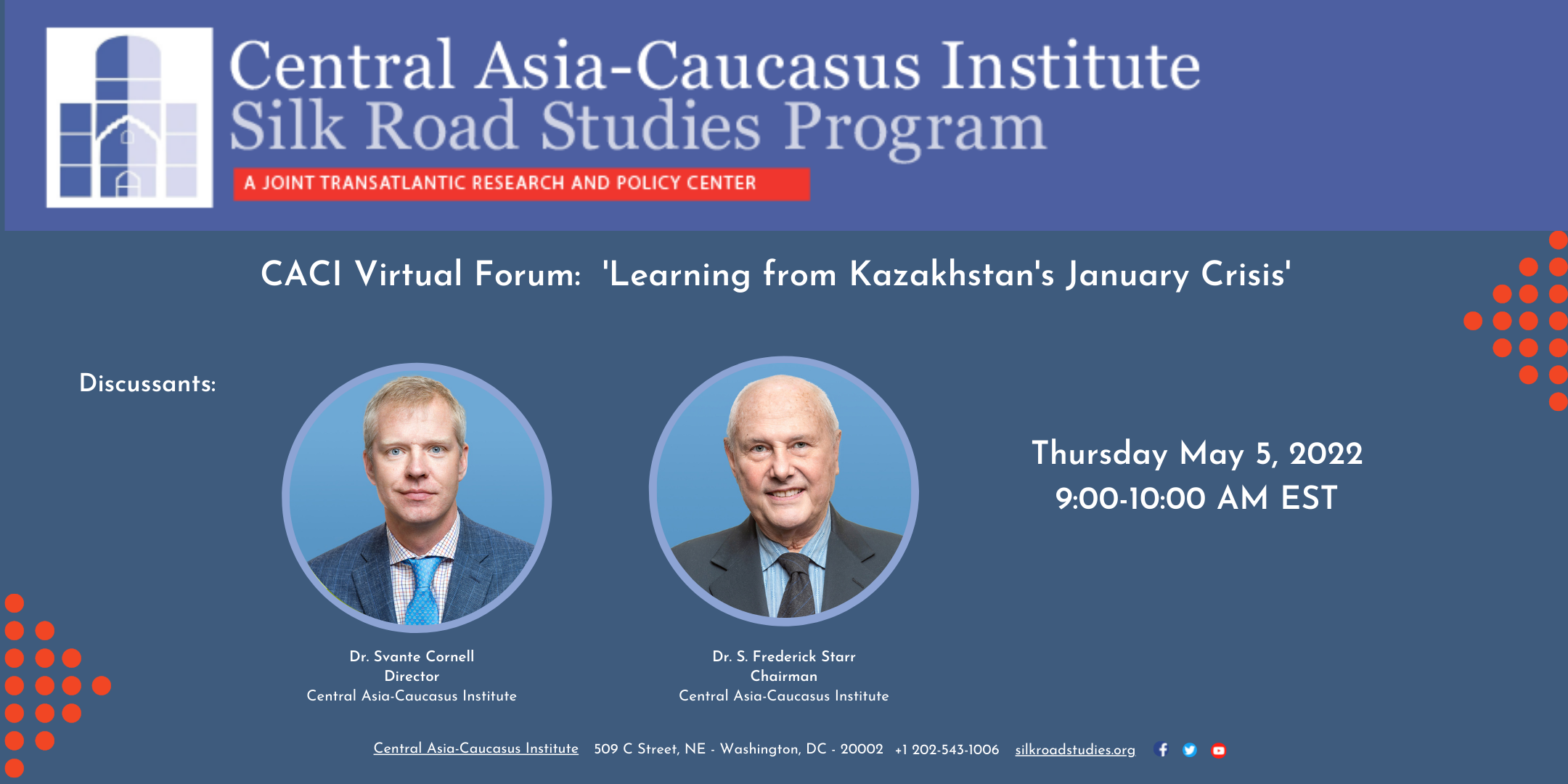Confronting Global Challenges in the CAMCA Region
CAMCA (Central Asia, Mongolia, the Caucasus and Afghanistan) is a vulnerable region grappling with a range of issues including low connectivity, economic dependency, food security, poor governance, corruption, and terrorism - all exacerbated by the COVID-19 pandemic. Not fully recovered from the pandemic's negative impacts, the war in Ukraine poses a new set of political and economic challenges. In addition, the reemergence of the Taliban and terrorist syndicate in Afghanistan has created a new phase of security challenges for the entire region. The presentation by the spring 2022 Rumsfeld Fellows examined the challenges posed to the CAMCA region by the pandemic, Taliban, and Ukrainian conflict, and suggest possible solutions.
When: Tuesday, May 3, 2022, 3:00-4:30 PM EST
Where: Middle East Institute, 1763 N St NW, Washington, DC 20036
Co-organizers: The Central Asia-Caucasus Institute at AFPC, The CAMCA Network and The Rumsfeld Foundation
CACI Virtual Forum: Learning from Kazakhstan's January Crisis
In January 2022, Kazakhstan experienced an unprecedented political crisis. Though since overshadowed by events in Ukraine, it marked a turning point in the country’s history - one that will have considerable implications for the future of Central Asia. Those events are the subject of a new publication by Dr. Svante Cornell, and he will discuss his analysis and its major findings at our upcoming Forum.
Date: May 5, 2022, 9:00 AM EST.
Discussants:
- Svante Cornell, Director, Central Asia-Caucasus Institute at the American Foreign Policy Council
- Fred Starr, Chairman, Central Asia-Caucasus Institute at the American Foreign Policy Council

CACI Forum: Turkey and the Russia-Ukraine War: Impact on Central Asia and the Caucasus
Turkey is trying to avoid openly taking sides in the war of Russia against Ukraine. While condemning the Russian invasion and supplying Bayraktar drones to Ukraine, Turkey did not join the economic sanctions against Russia and in fact may seek to benefit from the Western sanctions against Russia, all while acting as a facilitator of negotiations between the parties. The backdrop of Turkey’s actions is gradually growing Turkish influence in the Caucasus and Central Asia. In this forum, speakers will address how Turkey’s strategy affects the wider region from Eastern Europe to Western China.
Date: April 20, 2022, 10.00 AM, EST.
Speakers:
- Ambassador Matthew Bryza, Board Member, Jamestown Foundation\
- Suat Kiniklioglu, Former Member of the Turkish Parliament
- Svante Cornell, Director, Central Asia-Caucasus Institute at the American Foreign Policy Council
Moderator:
Fred Starr, Chairman, Central Asia-Caucasus Institute at the American Foreign Policy Council
Register for the Zoom webinar: https://us02web.zoom.us/webinar/register/WN_nvN2Lu0ZROKoZASfi8Su1w
The event will also be live-streamed on the CACI Facebook page and here on the Silk Road Studies website.
CACI Forum: Lessons from Kyrgyzstan's Experiment with Parliamentarism
Lessons from Kyrgyzstan's Experiment with Parliamentarism
This CACI Forum will present some of the findings of the newly published paper from the Silk Road Papers series, authored by Dr. Johan Engvall. The paper examines successes and failures of Kyrgyz experiment of parliamentarism, which ended in 2021. Our speakers will offer analysis and comments on this unique experience for Central Asia, which lasted about a decade.
WHEN: Mar 3, 2022 10:00-11:15 EST
Speakers:
- Johan Engvall, Deputy Research Director at the Swedish Defense Research Agency. He is a Nonresident Senior Fellow with the Central Asia-Caucasus Institute and Silk Road Studies Program Joint Center.\
- Erica Marat, Associate Professor, College of international Security Affaires, National Defense University
Moderator:
- Svante Cornell, Director, Central Asia-Caucasus Institute at the American Foreign Policy Council
CACI Forum: In Ukraine’s Shadow: The Kazakh crisis and the need for a new U.S. strategy in Central Asia
CACI Forum: In Ukraine’s Shadow: The Kazakh crisis and the need for a new U.S. strategy in Central Asia
Since the U.S. launched its Central Asia strategy in February 2020, momentous changes have taken place. The U.S. left Afghanistan, new leadership in Kyrgyzstan, and the recent unrest in Kazakhstan are only the most significant examples. Meanwhile, tensions over Ukraine dominate the U.S. foreign policy agenda. While Central Asia should be part of U.S. strategic thinking, it does not seem to be. Against this background, the Central Asia-Caucasus Institute convened a forum to discuss how U.S. Central Asia Strategy can be improved in light of these circumstances.
Speakers:
- Ambassador (retired) George Krol, Adjunct Professor, The US Naval War College and Associate, Davis Center for Russian and Eurasian Studies, Harvard University
- Margarita Assenova, Senior Fellow, The Jamestown Foundation
- S. Frederick Starr, Chairman, Central Asia-Caucasus Institute at the American Foreign Policy Council
Moderator:
- Svante Cornell, Director, Central Asia-Caucasus Institute at the American Foreign Policy Council

